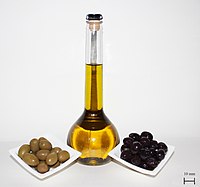
Photo from wikipedia
Abstract Olive mill wastewater was converted into bio-oil via thermochemical liquefaction with alcohol/water mixtures in an autoclave (998 ml). The influence of operating conditions on the yield of liquefaction products was… Click to show full abstract
Abstract Olive mill wastewater was converted into bio-oil via thermochemical liquefaction with alcohol/water mixtures in an autoclave (998 ml). The influence of operating conditions on the yield of liquefaction products was investigated. Liquefaction experiments were performed at various reaction temperatures in the range of 240–320 °C. Experimental results indicated that alcohol (methanol or ethanol)/water mixtures had synergistic effects on olive mill wastewater direct liquefaction. The ratio 50% (w/w) co-solvent of either ethanol-water or methanol-water and a reaction temperature of 280 °C were found to be the most effective. Under these conditions and for a reaction time of 30 min, the bio-oil yield was 92.31 wt% for ethanol-water and 77.97 wt% for methanol-water. The bio-oil produced with methanol-water mixture has higher energy content (43.20 MJ/kg) compared to the one obtained with ethanol-water mixture (39.21 MJ/kg). In addition, Fourier transform infrared spectroscopy and gas chromatography-mass spectrometry analyses showed high esters concentrations and low free fatty acid content in the obtained bio-oils.
Journal Title: Fuel
Year Published: 2019
Link to full text (if available)
Share on Social Media: Sign Up to like & get
recommendations!